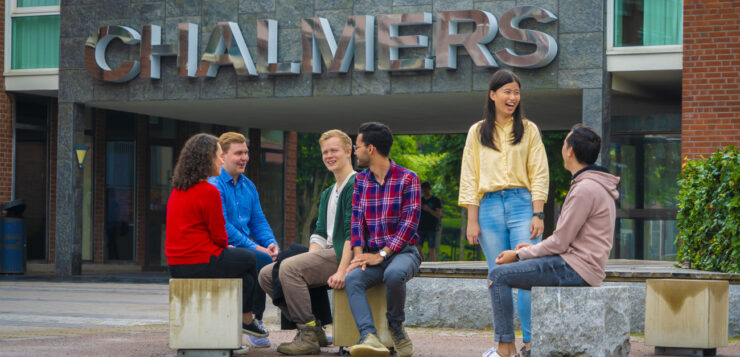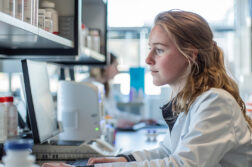Chalmers offers dozens of master’s programs, taught entirely in English, to prepare you for a global career.
Qualify for a global career with a master’s degree from Chalmers University of Technology. We offer master’s programs in engineering, architecture, and technology management and you’ll be right at the cutting edge of your field, taught by people who are highly active in both research and industry.
Chalmers University of Technology offers around 40 master’s programs taught entirely in English to prepare you for a truly international career, with our global focus attracting students from over 60 countries.
Completing a master’s thesis
At Chalmers, all master’s programs are completed with a master’s thesis. A 30-credit thesis is done in one semester and a 60-credit thesis takes two semesters to finish.
The thesis is an important part of your studies, as it shows that you have acquired the knowledge you need. This is the part of the program where you have the most control, since you can choose a focus area that interests you — and maybe lead to a job down the line.
When you work on your master’s thesis, or on other projects, you are typically supervised by a professor or lecturer. Your supervisor supports and guides you through the research and writing of your thesis. Supervision is usually conducted individually or in small groups.
Master’s programs by field of study
You may not be familiar with the master’s programs on offer at Chalmers University of Technology. Here are our areas of focus:
Architecture
Design sustainable real-life projects together with local stakeholders or explore creative design processes in an urban setting in one of our prominent Architecture programs.
Automation and mechatronics
Contribute to a future where functions for sensing, monitoring, and control integrate with a range of mechatronic and robotic products, systems, and services.
Biotechnology and chemical engineering
Bioscience and chemical engineering have never been as exciting as they are today. Fields such as pharmaceuticals, new sustainable products and processes, catalysis, and pulp and paper are focus areas for Chalmers’ education and research.
Civil engineering
The construction sector is one of the largest in the Swedish economy and plays a highly visible role in all aspects of society, including the day-to-day existence of individuals and businesses. At Chalmers we cover the whole area, from planning to implementation, while paying careful attention to environmental issues, societal questions, energy use, and financial concerns.
- Design and construction project management
- Infrastructure and environmental engineering
- Sound and vibration
- Structural engineering and building technology
Computer engineering
Amazingly rapid development has placed computers and transmission of information in the centre of almost every area of science, engineering, and society. In this field you will learn how to process, store, and analyze information in a fast and secure way. Research at the department is at the forefront internationally in several areas.
- Computer science – algorithms, languages, and logic
- Computer systems and cybersecurity
- High-performance computer systems
Electrical engineering
Electronics and electro-mechanical based devices can change the way in which electric energy is produced, transported, and used in order to move towards a more sustainable future. In this field, you can improve healthcare delivery or design sustainable electric power systems. You can also be a part of building the communication systems of tomorrow by developing the internet of things, 5G, space technology, and satellites.
- Biomedical engineering
- Embedded electronic system design
- Information and communication technology
- Sustainable electric power engineering and electromobility
- Wireless, photonics, and space engineering
Industrial engineering and management
Investment in research and development alone is not sufficient to ensure long-term development and growth. Promising new knowledge needs to be transformed into economic value through new growth companies or through the licensing and transfer of technology to established companies. Logistics is the science of planning, organizing, and controlling the material flow from raw material to end-consumption and phase-out.
- Entrepreneurship and business design
- Management and economics of innovation
- Quality and operations management
- Supply chain management
Information engineering
An explosion of artificial intelligence (AI) technology is now sweeping the world, making huge impacts on our society. New technologies also bring new challenges. There will be a constant need for improved algorithms and new applications. In this field you will develop artificial intelligence, create the latest interactive technology, or deliver high-quality software.
Maritime management
Train to become a competent leader, both onboard ships and in onshore organisations in a field that will prepare you to guide your shipping industry into a new era.
Mechanical and industrial design engineering
Research at Chalmers focuses largely on shortening the lead time from needs to finished products while at the same time achieving added value for the customer. The requirements for products and the elements from which they are composed are increasing all the time. One example is the need to reduce exhaust emissions from internal combustion engines or the need for vehicles to be lighter, emit less noise, and be safer for both passengers and the environment.
- Applied mechanics
- Industrial design engineering
- Materials engineering
- Mobility engineering
- Product development
- Production engineering
- Sustainable energy systems
Physics, mathematics, and environment
Chalmers relies on a solid scientific base in natural sciences and mathematics. From this base we are able to conduct applied research and to educate across a wide spectrum of engineering sciences. Through investigations into the history of the universe and the Earth’s changing environment, we search for a greater understanding of the origin of stars and galaxies, the future of the Earth, and the prerequisites for life on other planets.
- Complex adaptive systems
- Engineering mathematics and computational science
- Industrial ecology
- Nanotechnology
- Physics
Technology and learning
Learning and leadership is a unique master’s program that combines your knowledge in mathematics, natural sciences, and technology with skills in communication and collaboration.
Master’s programs at Chalmers University of Technology last two years, are taught in English, and are worth 120 ECTS credits. Upon completion of studies, you will be granted a master of science degree: MSc.
Have questions about Chalmers, or our various master’s programs? Reach out to the Chalmers Servicecenter any time. Just email kontakt@chalmers.se and a member of Chalmers staff will get back to you.
We hope to see you on campus soon.







